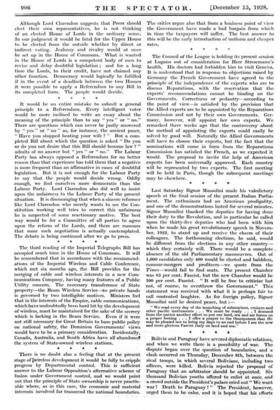It would be an entire mistake to submit a general
principle to a Referendum. Every intelligent voter would be more inclined to write an essay about the meaning of the principle than to say " yes " or " no." There are questions which can never be justly answered by " yes " or " no " as, for instance, the ancient poser, " Have you stopped beating your wife ? " But a com- pleted Bill about which the question is asked " Do you or do you not desire that this Bill should become law ? " admits of no answer but " yes " or " no." The Labour Party has always opposed a Referendum for no better reason than that experience has told them that a negative is more frequent than an affirmative in cases of doubtful legislation. But it is not enough for the Labour Party to say that the people would decide wrong. Oddly enough, we find ourselves more democratic than the Labour Party. Lord Clarendon also did well to insist upon the unfairness to the Labour Party of the present situation. It is discouraging that when a sincere reformer like Lord Clarendon who merely wants to see the Con- stitution working well tries to correct this unfairness he is suspected of some reactionary motive. The best way would be for a Committee of all parties to agree upon the reform of the Lords, and there are rumours that some such negotiation is actually contemplated. The debate is being continued after we go to press.
* * * *








































 Previous page
Previous page